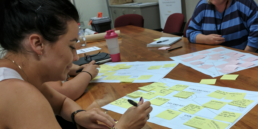Client
Telstra Health
Sector
Healthcare
Services
Research & insights
Deliverable
- Actionable Report
- MVP
Overview
Telstra Health partnered with our agency to identify opportunities to enhance in-home care services for aged and disability care recipients.
Faced with challenges such as workforce shortages, long waitlists, and inconsistent care quality, Telstra Health aimed to revolutionise service delivery through a customer-centric approach. Over five weeks, we conducted in-depth research to uncover key pain points and deliver actionable areas to focus on improving in-home care outcomes.

Strategy
Our approach was grounded in user experience design principles:
Simplify
Simplify administrative and management processes to reduce friction for service providers.
Empower
Empower recipients with tools to manage their care plans independently.
Trust
Foster trust through transparent communication and real-time updates.
Results
Impact Metrics
20%
Workforce Retention
Training and recognition initiatives boosted support worker morale.
25%
Reduction in Waitlists
Optimised scheduling improved service availability.
30%
Increase in Recipient Satisfaction
Enhanced self-management tools empowered recipients.

Unmet Needs Identified
Care Recipients
Inconsistent and unreliable care schedules lead to disruptions in daily routines.
Lack of clear communication regarding changes or updates to services.
Limited ability to manage or customize care plans independently.
Carers
High levels of burnout due to excessive workloads and limited support.
Lack of recognition or career advancement opportunities, impacting morale.
Insufficient training on tools and processes creates inefficiencies.
Providers
Administrative burdens due to outdated scheduling and rostering systems.
Difficulty maintaining consistent care standards across diverse geographical areas.
Limited real-time visibility into workforce availability and recipient needs.
Research and Insights
To gain a comprehensive understanding, we employed a user-centered research methodology:

Initial Research
To set a strong foundation for the project, we collaborated closely with Telstra Health staff and Subject Matter Experts (SMEs). During these sessions, we gathered and analysed real-world stories and insights observed within the healthcare space. This approach helped us to:
- Identify critical gaps in knowledge and service delivery.
- Validate existing assumptions with experienced perspectives.
- Distinguish between known facts and areas requiring further exploration.

In-Home Interviews
We engaged with 34 participants, including care recipients, families, support workers, and service providers.

Contextual Inquiry
We shadowed support workers to observe daily workflows and client interactions.

Empathy Mapping
We ran workshops to visualise people's daily emotional journeys with support workers and service provider staff.

Competitor Analysis
We evaluated platforms like HireUp and other emerging fin-tech healthcare services.
Execution
Proposed solutions we designed for implementation
Applications
Tools to enable recipients to manage their care plans, schedules, and funding.
Streamlined Operations
Enhanced scheduling systems for efficient resource allocation.
Communication Enhancements
Direct channels for better coordination between stakeholders.
Accessible Technology
Simplified interfaces and support for elderly users.